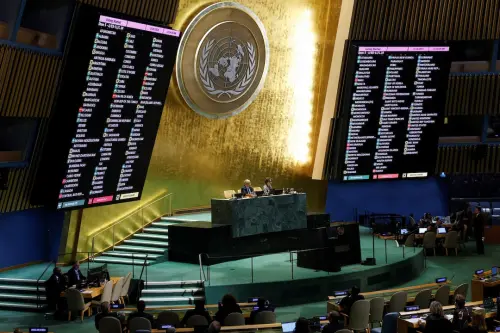The United Nations Security Council, on the third anniversary of the conflict, adopted a U.S.-drafted resolution on Monday, maintaining a neutral position, while U.S. President Donald Trump strives to mediate an end to the war.
The brief resolution mirrors Trump's recent approach and his more conciliatory stance towards Russia, contrasting with former President Joe Biden's administration advocating for Ukraine at the United Nations throughout the conflict.
Russian Ambassador to the U.N., Vassily Nebenzia, recognized "constructive changes" in the U.S. position and described the resolution as "a starting point for future efforts towards a peaceful settlement."
Despite deadlock due to Russia's veto power, the 193-member General Assembly has consistently supported Ukraine's sovereignty and territorial integrity, endorsing a just, lasting, and comprehensive peace in alignment with the U.N. Charter.
While the Security Council approved the U.S. resolution with 10 votes in favor, some nations such as France, Britain, Denmark, Greece, and Slovenia abstained. Acting U.S. Ambassador to the U.N., Dorothy Shea, hailed the resolution as a critical first step towards peace.
However, concerns arose that Trump's mediation strategy overly focused on Russia, potentially sidelining other involved parties in peace talks.
Ambassadors from Britain and France emphasized the importance of signaling that aggression does not go unpunished and called for a clear acknowledgment of the conflict's origins to pave the way for sustainable peace in Ukraine.
In the General Assembly, resolutions do not hold binding power, though they carry political weight, reflecting the global perspective on the war. The Assembly's support for Ukraine and the amended U.S.-drafted resolution underscored diplomatic victories for Ukraine and European states.
Ukraine's Deputy Foreign Minister Mariana Betsa stressed that the conflict extends beyond Ukraine, touching on fundamental rights of countries to exist, choose their paths, and live free from aggression.
In the assembly, the amended U.S.-drafted resolution and the resolution put forth by Ukraine and European countries garnered significant support, with Russia's attempt to amend the U.S. text being unsuccessful. The latter resolution received approval, despite opposition from Russia, North Korea, and Israel.
